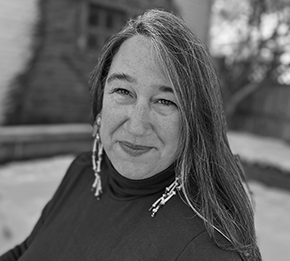Peace Path
This path our people walked
one hundred two hundred endless years
since the tall grass opened for us
and we breathed the incense that sun on prairie
offers to sky
Peace offering with each breath
each footstep out of woods
to grasslands plotted with history
removal remediation restoration
Peace flag of fringed prairie orchid
green glow within white froth
calling a moth who nightly
seeks the now-rare scent invisible to us
invisible history of this place
where our great-grandfather a boy
beside two priests and 900 warriors
gaze intent in an 1870 photo
his garments white as orchids
Peace flag white banner with red cross
crowned with thorns held by a boy
at the elbow of a priest
beside Ojibwe warriors beside Dakota warriors
Peace offered after smoke and dance
and Ojibwe gifts of elaborate beaded garments
thrown back in refusal
by Dakota Warriors torn with grief
since their brother’s murder
This is the path our people ran
through white flags of prairie plants
Ojibwe calling Dakota back
to sign one last and unbroken treaty
Peace offering with each breath
each footstep out of woods
to grasslands plotted with history
removal remediation restoration
Two Dakota held up as great men
humbled themselves
to an offer of peace
before a long walk south
before our people entered the trail
walking west and north
where you walk now
where we seek the source
the now-rare scent
invisible as history
history the tall grass opens for us
Breathe the incense of sun on prairie
Offer peace to the sky
Copyright © 2016 by Heid E. Erdrich. This poem was commissioned by the Academy of American Poets and funded by a National Endowment for the Arts Imagine Your Parks grant.
"The North Country Trail leaves Minnesota and heads toward Fort Abercrombie just above my hometown—Wahpeton, North Dakota. This poem envisions the tallgrass prairie as I have seen last remaining swaths of it in areas of the trail. The poem depicts events that took place when the grassland was unbroken and when our great-grandfather, Keesh-ke-mun-ishiw/Joseph Gourneau, serving as an altar boy and standard bearer for a Catholic priest, was photographed at Fort Abercrombie in 1870.
The path the North Country Trail traces from the Lake Superior shore through the North Dakota grasslands, maps the migration of my Ojibwe ancestors as they moved, and were removed, from their territories as treaties decreed. For me, and for other Native Americans, a map of the trail tells a specific story, one of tribal history.
The Grasslands stand as an emblem of peace for me—the hush of wind in tall grasses, the surprise of wild roses and rare lilies, the open faces of sunflowers in fields, the prairie potholes where water is life and the home of thousands of birds—this peace, like the weathered wooden structures of previous centuries, remains for everyone to walk by along the western section of the North Country Trail."
—Heid E. Erdrich
About the Sioux-Chippewa Peace Conference of 1870, with photograph
For further reading: American Indians and National Parks by Robert H. Keller and Michael F. Turek

